I have been searching for alternatives to the big gatekeepers of the internet of late over the last 2 or 3 years. Driven mainly by Facebook’s abuses of data. I have found a number of services, applications and tools that are operating outside the walled gardens of Facebook, Amazon, Apple, and Google.
Some services replace platforms like Instagram, others are hybrids of Twitter and Instagram and Facebook, and others are a retro step back to the early days of the internet, where text reigned supreme. Most are run by volunteers who have the tech skills to run and organise and moderate these things.

These services are for instagram pixelfed.social, [free open source] Glass [glass.photo] a subscription model. Mastadon is a Facebook replacement, the platform runs “instances” I am connected to two. AusGalm.space you will need to “apply” to join and mastodon.social. Joining is simple easy and quick. [I’m hoping to merge the two soon]. And lastly discord. This is a social space where people with common interests congregate. The groups are called servers, currently I participate in several from my own specially created one for flickr users to others much more general in scope, like iPhone photography and online music listening.

Lastly a new internet protocol has been developed, this is super geeky and requires a special browser to read, I’m using Larange. It also requires access to a server that is configured to allow it to run if you want to write your own pages. The protocol is called gemini . This protocol is unlikely to ever take off the way the internet did in the mid to late 1990s, but for me this is fine. It is, I hope, going to be a space to build my writing skills. As it is text and hyperlink only protocol. At least it’s bit more user friendly than the gopher protocol.
Here’s a description from the documentation page of the project:-
Gemini is a new application-level internet protocol for the distribution of arbitrary files, with some special consideration for serving a lightweight hypertext format which facilitates linking between files. You may think of Gemini as “the web, stripped right back to its essence” or as “Gopher, souped up and modernised just a little”, depending upon your perspective (the latter view is probably more accurate). Gemini may be of interest to people who are:
Opposed to the web’s ubiquitous tracking of users Tired of nagging pop-ups, obnoxious adverts, autoplaying videos and other misfeatures of the modern web Interested in low-power computing and/or low-speed networks, either by choice or necessity Gemini is intended to be simple, but not necessarily as simple as possible. Instead, the design strives to maximise its “power to weight ratio”, while keeping its weight within acceptable limits. Gemini is also intended to be very privacy conscious, to be difficult to extend in the future (so that it will *stay* simple and privacy conscious), and to be compatible with a “do it yourself” computing ethos. For this last reason, Gemini is technically very familiar and conservative: it’s a protocol in the traditional client-server request-response paradigm, and is built on mature, standardised technology like URIs, MIME media types, and TLS.
☛ Website | Flickr | Instagram | Photography links | Twitter | Tumblr ☚



